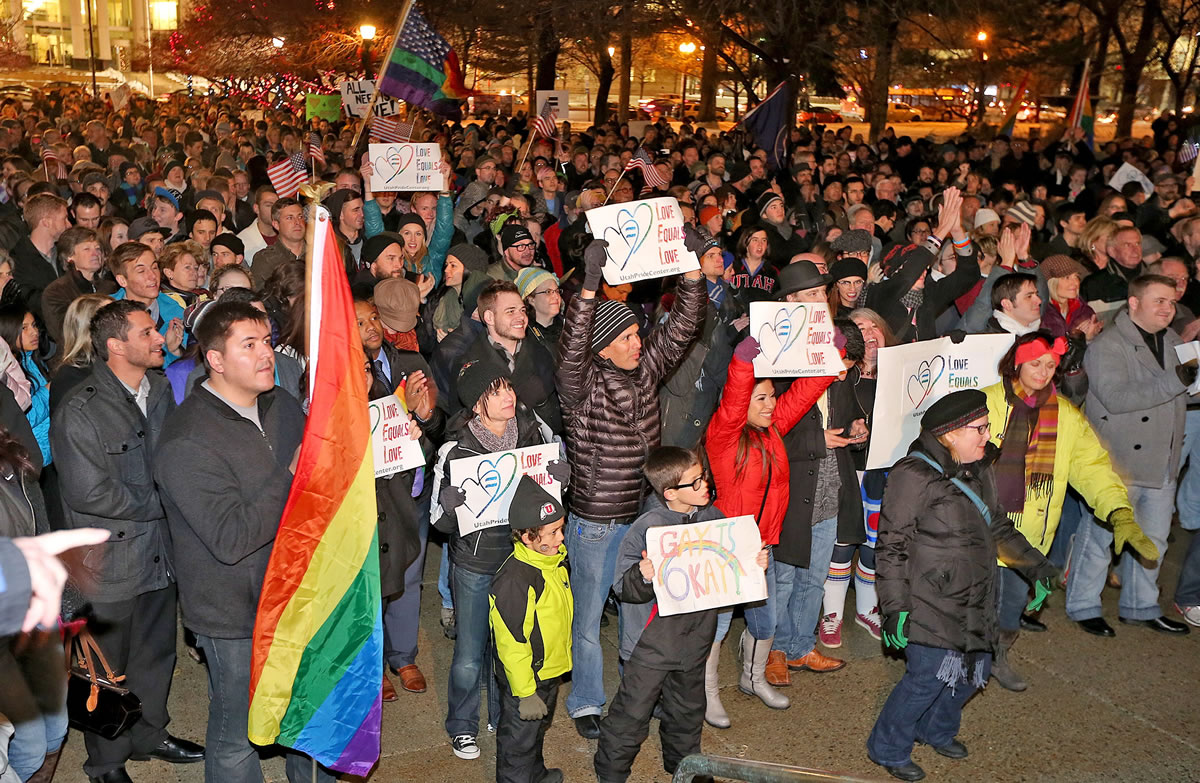SALT LAKE CITY — Advocates on both sides of the gay marriage debate predicted that the U.S. Supreme Court ruling in June that overturned part of a federal ban on gay marriage would create a pathway for states to act.
They were right.
In the six months since the decision, the number of states allowing gay marriage has jumped from 12 to 18, a trend that started before the high court ruling that’s been reinforced since. Judges in New Mexico, Ohio and, most surprisingly, conservative, Mormon-heavy Utah all ruled in favor of same-sex marriage in just the past week. Both Utah’s case and another in Nevada will next be heard by federal appeals courts, putting them on the path toward the high court. Ohio’s case, which recognized same-sex death certificates, also will likely be appealed.
The series of court decisions has many asking: When will the Supreme Court step in and settle the issue for good?
It may not be that simple.
The cases on the path to the Supreme Court now differ little from a case justices refused to hear in June, at the same time they made their landmark ruling on the federal law denying tax, health and other benefits to legally married same-sex couples.
That case, from California, hinged on a constitutional amendment defining marriage as between a man and a woman.
If the justices had acted, it would have struck down gay marriage prohibitions across the country.
Instead, the justices passed, relying instead on a technical legal argument to resolve the California case and clear the way for same-sex marriage in the state, which resumed at the end of June.
That convinces some legal scholars that the high court won’t take up the issue again so soon. In a way, they’ve already passed the buck to the states, some say, including language in their Defense of Marriage Act ruling saying it relegates same-sex marriages to second-class status, and “humiliates tens of thousands of children now being raised by same-sex couples.”
That language makes it clear state bans are ripe for challenge, said Andrew Koppelman, a professor of law and political science at Northwestern University. Language from both Justice Anthony Kennedy’s majority opinion and Justice Antonin Scalia’s biting dissent have appeared prominently in subsequent court challenges and rulings, including in Utah and Ohio. A federal judge in Ohio ordered officials to recognize gay marriages on death certificates.
“The Supreme Court has given them ammunition to go there if that’s where they want to go,” Koppelman said.
Alongside state court decisions has come a shift in public sentiment about gay marriage. Only one-third of Americans oppose gay marriage, down from 45 percent in 2011, an AP-GfK October poll showed.
With Utah’s ban struck down, 28 states still have constitutional prohibitions on same-sex marriage. Another four states — Indiana, Pennsylvania, West Virginia and Wyoming — do not permit it through state laws.
Attorneys and proponents say this is the civil rights issue for the current generation, comparing the scenes of gay couples marrying at county clerks offices to blacks breaking racial barriers in the 1960s.
More state rulings in favor of gay marriage could be in the works in 2014. The thinking goes, if it can happen in ultra-conservative Utah, it can happen anywhere. Utah is home to The Church of Jesus Christ of Latter-day Saints, which still teaches its members homosexuality is a sin despite a softening of their rhetoric in recent years.
“The ruling has had a symbolic impact already,” Jon Davidson, director of Lambda Legal, which pursues litigation on LGBT issues nationwide. “It is recognition that the nation’s attitudes, from public to legislative to judicial, are changing very rapidly in all parts of the country.”
“And the opponents, many of them, are moving on,” said William Eskridge, a professor at Yale Law School. “We are not seeing the same kind of Armageddon rhetoric we saw in the 1990s.”
A federal judge in Michigan will hear testimony from experts in February before deciding whether to throw out the state’s constitutional ban on same-sex marriage. Two federal lawsuits in Virginia, including one being led by the same legal team that challenged California’s ban, are moving forward.
Eskridge disagrees with those who say the Supreme Court won’t act, predicting justices will get involved in the gay marriage dispute in the next year or two.
Different branches of the government are acting, he said — lawmakers, state courts, and federal courts — which could convince the justices to step in.
The long-term trend in favor of acceptance of same-sex marriage affects the courts. As each state’s same-sex marriage ban is struck down, it serves as a domino effect helping make the next legal challenge easier, said Jon Davidson, director of Lambda Legal, which pursues litigation on LGBT issues nationwide. The Ohio ruling this week cited the Utah ruling from last week.
“You are going to see more federal courts do what just happened in Ohio and Utah,” Koppelman predicted.



